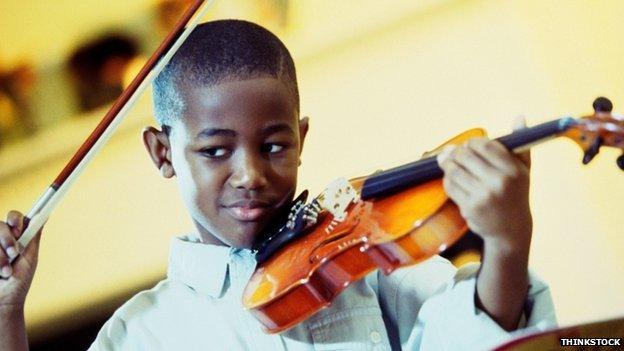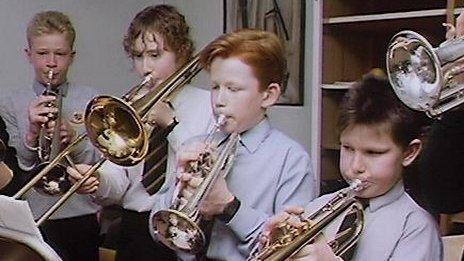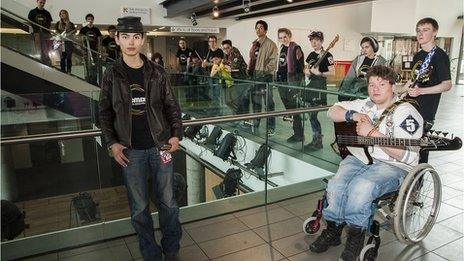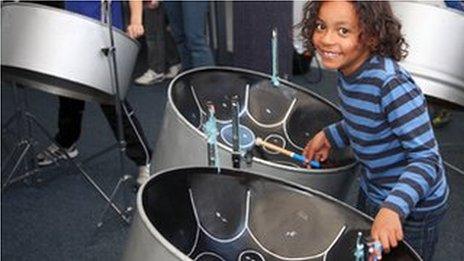'Crazy funding cuts put music education at risk'
- Published

Music education cuts 'could cost the soul of this nation dearly' argue musicians
Successive funding cuts are putting the government's National Plan for Music Education at risk, say musicians, including cellist Julian Lloyd Webber.
Mr Lloyd Webber said it was "crazy" that funding for music education had already been "slashed" and faced "even further cuts".
The Incorporated Society of Musicians (ISM) opposes government proposals for cuts to local authority music spending.
The government said it had committed £196m over three years to music.
The Department for Education says the money is channelled into 123 music hubs under the National Plan for Music Education.
It argues this means local authority spending on music will be less necessary.
'Delicate ecology'
A DfE consultation document suggests local authorities should consider cutting the amount they allocate to music from a central government grant.
The Education Services Grant (ESG) is paid per pupil to local authorities and academies to spend as they wish on pupil support and extra-curricular activities.
This can include anything from clothing and lodging grants to outdoor education, visual and performing arts and music education.
The document says £200m of savings are needed from the grant and suggests some of this could come from music.

Pupils, parents, teachers and musicians are urged to respond to a government consultation, which proposes cuts to local authority music spending
"Our expectation is that music services should now be funded through music education hubs, which can cover one or more local authority areas, and from school budgets, not from the ESG," it says.
However, the ISM says national music education funding is also falling - from £82.5m in 2010-11 to £58m in 2014-15.
It urges teachers, heads, parents, pupils, governors, musicians and the music industry to respond to the consultation before it ends later this month.
It argues reduced local authority funding "would result in a cut of millions of pounds to music services" and would "undermine" successful delivery of the government's "visionary" National Plan for Music Education.
The ISM says English local authorities contributed over £14m to music in 2012-13.
"Even where this is not part of the ESG, the funding could be put at risk," it said.
"By tampering with the delicate ecology of music education, there could be unintended consequences such as undermining progression routes from school through to both university and conservatoire and an adverse impact on the creation of the next generation of musicians.
"With the music industry being worth over £3.5bn to the British economy, we simply cannot take this risk".
The campaign has the support of leading musicians.
Julian Lloyd Weber said: "Music should be the birthright of all children.
"There has been too much talking and not enough action.
"We really need to rise above this kind of 'will we get funding this year, will it come next year?'
"It should be taken as read that our children learn music."
Violinist Nicola Benedetti said: "It is is widely acknowledged that music education can improve numeracy, literacy and social interaction and it deeply confuses and saddens me that we are having to fight so hard to save it.
"This isn't an investment into the lives of musicians and artists but in that of our entire society. This fundamental misunderstanding could cost the soul of this nation dearly."
Musical investment
The Musicians Union said it was committed to supporting music education to ensure quality provision "is accessible to every child".
"This will not happen if funding for music education continues to be cut", said general secretary John Smith.
ISM chief executive Deborah Annetts, said: "It is vital that people respond to the government's consultation and get this damaging proposal removed".
A spokesman said the DfE would listen to the consultation responses before deciding how to proceed.
"We want every child in the country to have the opportunity to play and enjoy music. That is why music remains a statutory subject within the new national curriculum, and in fact there were more entries at GCSE in 2014 than the previous year.
"We have committed £171m over three years to 123 music hubs to ensure that every child aged five to 18 has the chance to learn a musical instrument and perform as part of ensembles and choirs.
"Thanks to these hubs, half a million children have been given the chance to learn a musical instrument for the first time and thousands of choirs, bands and orchestras have been started.
"We have also invested £84m so that exceptionally talented young musicians and dancers from low income families can benefit from specialist education and training."
- Published17 December 2013

- Published15 November 2013

- Published4 October 2013

- Published13 June 2012
